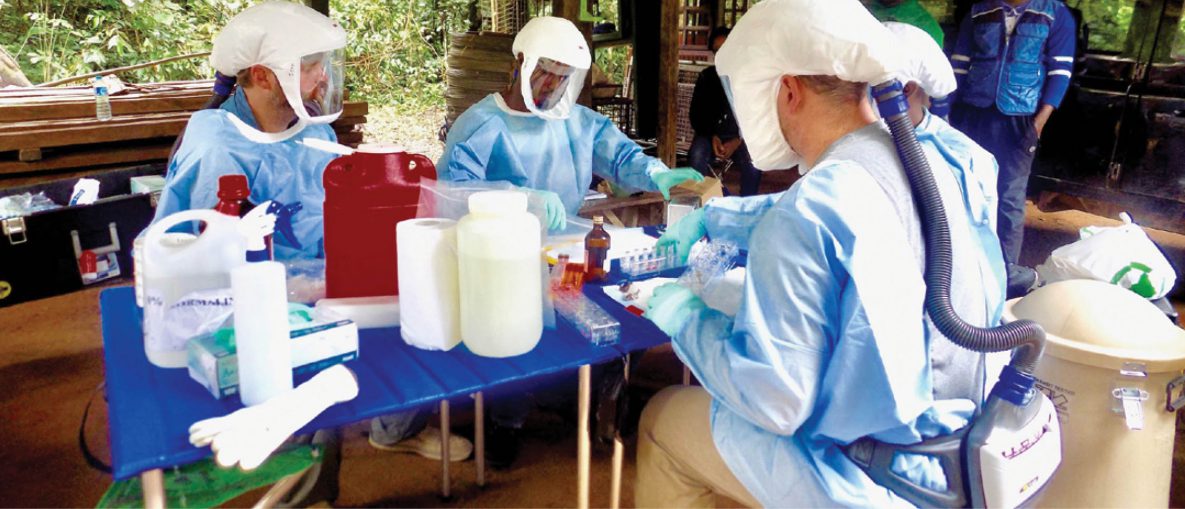Protecting Americans from the Threat of Infectious Disease
In This Report

The Global Health Security Agenda (GHSA), launched in 2014, is a global effort to strengthen the world’s ability to prevent, detect, and respond to infectious disease threats, whether they are naturally occurring, or accidentally, or intentionally released. The Centers for Disease Control and Prevention (CDC) plays a leading role in the implementation of the GHSA for the United States by working with countries to strengthen their capabilities to identify, track, and stop disease outbreaks and public health emergencies as quickly as possible. Because of the nature of infectious diseases, everyone remains vulnerable, including people living in the United States, until every country in the world can rapidly identify and contain public health threats.
Infectious Diseases Travel Faster and Farther Than Before
New and re-emerging diseases spread quickly across the globe, resulting in outbreaks that overwhelm health systems, jeopardize lives, and devastate economies. In today’s tightly connected world, a disease can be transported from a remote village to major cities on all continents in as little as 36 hours. Currently, the second largest Ebola outbreak is ongoing in the Democratic Republic of the Congo (DRC), in a resource-limited environment and armed conflict zone. This outbreak is another test of the world’s preparedness for infectious disease outbreaks and the collective capacity to respond rapidly to stop further spread[1]. Global outbreaks not only cause illness and death, they can also lead to a decrease in demand for U.S. services and exports, jeopardizing the economy and American jobs. When an uncontained outbreak becomes a regional or global epidemic, costs escalate, and national and regional economies suffer. Effective and functional global health security capabilities reduce the threat and economic consequence of infectious disease outbreaks to the United States and the world.
Strategic Vision for Global Health Security
The GHSA is a multisectoral and multilateral effort that seeks to accelerate progress toward implementation of the International Health Regulations (IHR) (2005)–the legally binding instrument adopted by 196 States Parties that set requirements for preparedness and response to public health emergencies. The strategic approach of GHSA is to build capacities across 11 technical areas spanning multiple sectors and disciplines, including animal and human health, agriculture, and security. While the international community has made significant progress in mitigating infectious disease threats, challenges remain, which underscores the importance of the ongoing work to improve global health security. To address these challenges, CDC works domestically and around the world to strengthen health security and expand the capacity to prevent, detect, and respond to public health threats.
11 GLOBAL HEALTH SECURITY ACTION PACKAGES
11 GLOBAL HEALTH SECURITY ACTION PACKAGES
ACROSS 3 PRIORITY AREAS
ACROSS 3 PRIORITY AREAS
TO ACHIEVE 3 CRITICAL HEALTH SECURITY IMPACTS
TO ACHIEVE 3 CRITICAL HEALTH SECURITY IMPACTS
• Antimicrobial Resistance
• Zoonotic Disease
• Biosafety & Biosecurity
• Immunization
• Antimicrobial Resistance
• Zoonotic Disease
• Biosafety & Biosecurity
• Immunization


Prevent avoidable outbreaks
Prevent avoidable outbreaks
• National Laboratory System
• Real-Time Surveillance
• Reporting
• Workforce Development
• National Laboratory System
• Real-Time Surveillance
• Reporting
• Workforce Development


Detect threats early
Detect threats early
• Emergency Operations Centers
• Linking Public Health with Law
Enforcement & Multisectoral Rapid
Response
• Medical Countermeasures and
Personnel Deployment
• Emergency Operations Centers
• Linking Public Health with Law
Enforcement & Multisectoral Rapid
Response
• Medical Countermeasures and
Personnel Deployment


Respond rapidly and effectively
Respond rapidly and effectively
CDC: A World Leader in Global Health Security
As the preeminent public health agency of the United States, CDC’s mission is to protect the health and safety of the American people. Global health security is a critical component of America’s national security and CDC has the responsibility, technical expertise, and unmatched experience to fulfill this mission that spans the globe. CDC employs experts in all aspects of public health, including infectious and non-infectious diseases, violence and injury prevention, environmental health, and emergency response. CDC plays a leading role in implementing the GHSA by utilizing its core strengths in disease surveillance and laboratory systems, workforce development, emergency management, border health security, and public health science, to assist other nations to prevent, detect and respond to health threats. CDC maintains world-class expertise in combating disease-specific health threats, domestically and in our overseas offices. For decades, CDC has used its technical expertise to combat threats across the globe, beginning with the response to smallpox and cholera outbreaks in 1958. CDC is a trusted partner to governments and global institutions that is working to limit health threats from coming to the United States from abroad.
CDC Forges Partnerships to Combat Infectious Disease Threats
Under the GHSA, the United States committed to partner with 17 Phase 1 countries (Bangladesh, Burkina Faso, Cameroon, Côte d’Ivoire, Guinea, Ethiopia, India, Indonesia, Kenya, Liberia, Mali, Pakistan, Senegal, Sierra Leone, Tanzania, Uganda, Vietnam). These countries receive technical assistance and financial support from CDC.
How CDC Advances GHSA
CDC works government-to-government with ministries of health, ministries of agriculture, and other relevant ministries, and directly with partner organizations to build capacity to contain diseases and prevent outbreaks at their source, before they spread. CDC also leverages partnerships with nongovernmental organizations, academia, multilateral organizations, the private sector, and other stakeholders to support this mission with host governments. Public health experts at CDC contribute their unique scientific expertise to these partnerships to strengthen national public health capacities, working hand-in-hand with countries to detect and contain global health threats and respond to epidemics. With partners, CDC has made great strides toward strengthening health security globally, focusing on the core technical areas of surveillance, laboratory, public health workforce development, and emergency management. CDC’s focus on these core capacities has already resulted in measurable progress in the 17 Phase 1 GHSA countries where CDC has invested time and resources. CDC works to ensure collaboration, increased engagement, and accountability across the GHSA community.